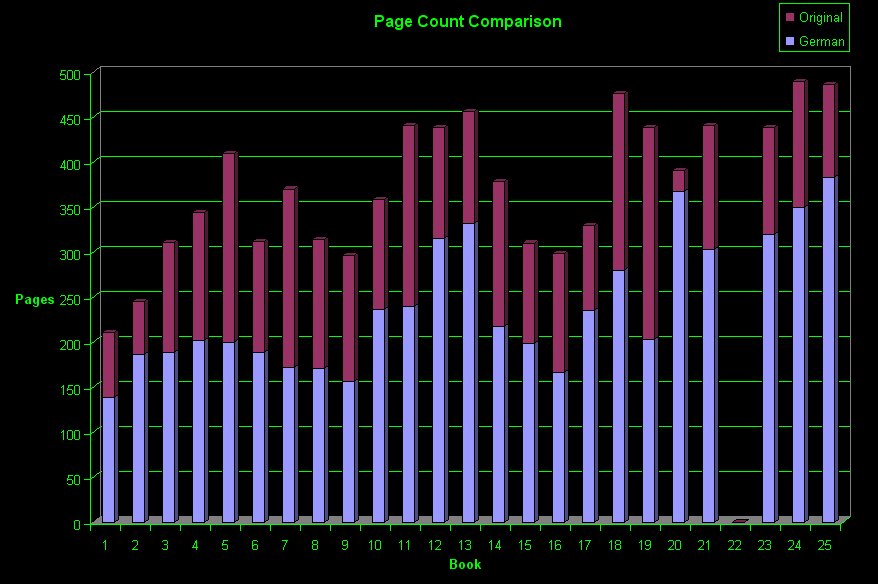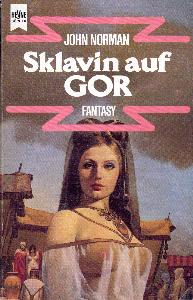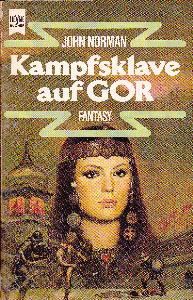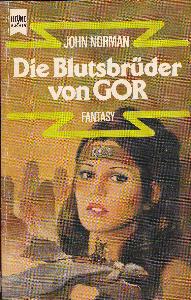


|
| ||
|
|
|
|

|
SILVER EDITION

|


|
SILVER EDITION |
Uncovering the German Censorship
by Simon van Meygaarden
|
Introduction Uncovering the German Censorship |
Page Count Comparison Chapter Comparison |
Conclusion Afterword |
Instead of taking you back to December 1966 and the start of Gor series with Ballantine's first edition of Tarnsman of Gor, there is another story that I would like to tell you first; a tale about one of the foreign translations of Counter-Earth and an in-depth investigation into the quality of the product; a research that unexpectedly uncovered yet another vicious attack on John Norman's great creation.
 Uncovering the German Censorship
Uncovering the German CensorshipIn 1973 the Saga of Counter-Earth reached the mainland of Europe when Munchen based publisher Wilherm Heyne released the German translation of Tarnsman of Gor, entitled Gor die Gegen-Erde. In the years that followed Heyne published another twenty-three Gor volumes, in several different printings. Book #22, Dancer of Gor (Gor die Gegen-Erde), was never published in the German language. The first nineteen books, Transman to Kajira, were translated by Thomas Schlueck, the others by Andreas Decker. I will show these books and their history in a seperate article.
A translation is the expression of the sense of a word, passage, or story, in a different language; and even when perfect translation from one language into another is almost impossible, these is a difference between a good and a bad translation, based upon the amount of translated content. So, with content in mind, let us examine the quality of the German translation.
 Page Count Comparison
Page Count ComparisonThe first indication of the quality of the translation comes from comparing the number of pages of the original Ballantine and DAW editions and the number of pages of the Heyne edition. In the table below, these page counts are displayed, together with the original and German titles and a percentage; showing for instance that in the German Tarnsman only 65% of the pages remained.
| Original Titles | Pages | German Titles | Pages | Remaining |
|---|---|---|---|---|
| Tarnsman of Gor | 211 | Gor die Gegen-Erde | 138 | 65% |
| Outlaw of Gor | 245 | Der Geächtete von Gor | 186 | 76% |
| Priest-Kings of Gor | 311 | Die Priesterkönige von Gor | 188 | 60% |
| Nomads of Gor | 344 | Die Nomaden von Gor | 202 | 59% |
| Assassin of Gor | 409 | Die Meuchelmörder vor Gor | 200 | 49% |
| Raiders of Gor | 312 | Die Piratenstadt von Gor | 188 | 60% |
| Captive of Gor | 370 | Sklavin auf Gor | 172 | 46% |
| Hunters of Gor | 314 | Die Jäger von Gor | 171 | 54% |
| Marauders of Gor | 296 | Die Marodeure von Gor | 156 | 53% |
| Tribesmen of Gor | 358 | Die Stammeskrieger von Gor | 236 | 66% |
| Slave Girl of Gor | 440 | In Sklavenketten auf Gor | 239 | 54% |
| Beasts of Gor | 438 | Die Bestien von Gor | 315 | 72% |
| Explorers of Gor | 456 | Die Erforscher von Gor | 332 | 73% |
| Fighting Slave of Gor | 378 | Kampfsklave auf Gor | 217 | 57% |
| Rogue of Gor | 310 | Der Schurke von Gor | 198 | 64% |
| Guardsman of Gor | 298 | Der Leibwächter von Gor | 166 | 56% |
| Savages of Gor | 329 | Die Wilden von Gor | 235 | 71% |
| Blood Brothers of Gor | 476 | Die Blutsbrüder von Gor | 280 | 59% |
| Kajira of Gor | 438 | Kajira von Gor | 203 | 46% |
| Players of Gor | 390 | Die Spieler von Gor | 367 | 94% |
| Mercenaries of Gor | 440 | Die Soeldner von Gor | 303 | 69% |
| Dancer of Gor | (479) | Die Tänzerin von Gor | --- | --- |
| Renegades of Gor | 438 | Die Verraeter von Gor | 319 | 73% |
| Vagabonds of Gor | 489 | Die Vagabunden von Gor | 349 | 71% |
| Magicians of Gor | 486 | Die Zauberer von Gor | 383 | 79% |
| English Total | 8,976 | German Total | 5,743 | 64% |
What to see what this looks like? Each bar is a book, the height of the bar is the number of pages, the top red part is what Heyne cut out, the bottom grey part is what Heyne left of it.

As Dancer was never published, the total number of pages of the original editions does not include the Dancer pages.
Based upon page counts, Captive of Gor (46%), Kajira of Gor (46%) and Assassin of Gor (49%) contain less than half of the original number of pages, while the average German Gor novel contains only 64% of the original pages.
It should considered that the German books are actually a little larger that the original Ballantine and DAW books, but the size of type-face used for the German books is also much larger than the American type-face. While the American books show between 299 (Outlaw of Gor) and 395 (Tribesmen of Gor) words on each page; on average, the number of words per page is about 379; the German books vary between 229 (Kampfsklave auf Gor) and 340 (Sklavin auf Gor), with an average around 272.
If a comparison is made based upon the estimated number of words of the German edition and the digital word-count of the American editions, the German edition uses about 50% of the number of words of the original editions.
Even more important, perhaps, is the fact that German texts usually take about a third more words than the similar American text; for English is a very efficient language. The actual amount of content left within the German translation therefor might even be less than 50%. So let us look at some examples.
 Chapter Comparison
Chapter Comparison
In the original Ballantine edition of Captive of Gor, Chapter 14, "I Must Submit" contained 30,532 characters, 5,850 words and 568 individual lines. In the Heyne edition of Sklavin auf Gor, Chapter 14, untitled, contained 14,828 characters, 2,409 words and 292 lines.
The German edition therefor deleted 15,704 characters, 3,441 words and 276 lines, and the German readers have to settle with 49% of the characters, 41% of the words and 51% percent of the lines.
What does it look like, one might ask. Let me show you; the German text can quite easily be translated back into English, and then it is possible to compare the change in content. In the following examples, taken from Chapter 14 of Captive of Gor, the bold text remained in the German edition, while all the normal, non-bold text was deleted.
Details are cut out:
I then began to walk through the camp. I saw the tents and the fires, and the men talking, and the girls about their tasks. I hated men. They made us work! Why did they not do their own cooking, and polish their own leather, and go to the stream or the washing shed and wash their own clothes? They did not do so because they did not wish to do so. They made girls do their work! I hated men. They dominated us and exploited us!
I found, in one place in the camp, a grassy area, on a slight hill. There was a metal ring there, near the top of the slight hill. It was fixed in a heavy stone, buried level with the grass.
In another place, I found a horizontal pole, itself set on two pairs of poles, leaning together and lashed at the top. It was, I gathered, a pole for hanging meat. Oddly enough, there was also an iron ring, set in a stone, buried in the ground, beneath the center of the horizontal pole. Off to one side, in an open area there was a small iron box, a square of some three feet in dimension. In the front of the box there was a small iron door, with two slits in it. One, near the top, was about seven inches in width and about a half inch in height; the other, its top formed by a rectangular opening in the bottom of the door, its bottom formed by the iron floor of the box, was about a foot wide and two inches in height. The door could be closed with two heavy, flat, sliding bolts, and locked with two padlocks. I wondered what could be kept in such a box.
Bondage is taken out:
I was led through the camp, and, here and there, some men and slave girls followed me.
I came to a clearing, before the tent of Rask of Treve. He was waiting there. On my tether I was led before him. I looked at him, frightened.
We stood facing one another, I about five feet from him.
"Remove her tether," he said.
Ena, who had accompanied me, unknotted the rope, and handed it to one of the girls.
I wore the long, scarlet garment, hooded, sleeveless. My hands were bound behind my back with binding fiber.
"Remove her bonds," said Rask of Treve.
In his belt I saw that he had thrust an eighteen-inch strip of binding fiber. It was not jeweled. It was about three quarters of an inch in thickness; it was of flat, supple leather, plain and brown, of the sort commonly used by tarnsmen for binding female prisoners.
Ena untied my wrists.
Rask and I regarded one another.
From the content, less than 40% remains.
 Fighting Slave of Gor (Kampfsklave auf Gor)
Fighting Slave of Gor (Kampfsklave auf Gor)
The German Gor books do not contain any chapter titles or a table of contents; the chapters are indicated by a single number. But to my surprise, the German translation of Fighting Slave of Gor, entitled Kampfsklave auf Gor, contains only 25 chapters, while the original DAW edition has 34 chapters; somehow, it seems, nine chapters have been erased.
The first six chapters of the original book are all present in the german translation; shortened to about 70%.
Chapter 7. "I Am Thrown a Woman" starts with three pages describing Jason's reflections, which are all present in the German version. But then, Lola is thrown into Jason's cell, and for about twenty-eight pages, Jason struggles with his Earthly conditioning. Well, in Germany, Lola is completely forgotten; the twenty-eight pages are skipped, and so is chapter 8. "I Am Shamed; I Will Leave the House of Andronicus" and chapter 9. "I Am Goods Bound for the Market of Tima".
After erasing thirty-five pages, the German version continues with chapter 10. "I Find Myself Slave in the House of the Lady Tima; I Am Recreation for the Lady Tima, After She has Finished her Work", of which only 75% of the text remains.
The chapters 11 through 28 are all present in the German edition, but they are numbered 8 through 24, and the percentage of remaining text varies between 27% for chapter 22 and 24 to about 95% for chapter 25.
Then again several chapters are erased - chapter 29. "We Move South; The Tale Told by a Strand of Hair; I Decide to Prepare the Lady Florence for Slavery", chapter 30. "We Resume our Journey", chapter 31. "We Continue our Way Southward" and chapter 32. "I Do Not Listen to the Entreaties of the Lady Florence". Sixteen pages are gone.
The last chapter of the German translation, number 25, contains 33% of chapter 33. "We Will Enter the Camp of Tenalion; The Leash" and about 70% of chapter 34. "We Enter the Camp of Tenalion; I Sell the Lady Florence; I Must Now Search for the Slave, Beverly Henderson".
From the content, less then 35% remained.
 Blood Brothers of Gor (Die Blutsbrüder von Gor)
Blood Brothers of Gor (Die Blutsbrüder von Gor)
In the original Ballantine edition of Blood Brothers of Gor, Chapter 9, "This occurred in the lodge of Cuwignaka" contained 30,916 characters, 5,822 words and 1,050 individual lines. In the Heyne edition of Die Blutsbrüder von Gor, Chapter 9, untitled, contained a meager 7,334 characters, 1,183 words and 163 lines.
This time the German edition erased an astounding 23,582 characters, 4,639 words and 887 lines. The Gor fans in Germany are left with 24% of the characters, 20% of the words and 16% percent of the lines.
The first page of the chapter is translated quite literally, and then suddenly half of the chapter is skipped. In the middle of a large dialog, the German edition continues.
"I love being owned by men," she said. "I do not find it degrading or debasing. I find it exalting and fulfilling. Do not despise me for what I am."
"And what are you?" I asked.
"A woman," she said.
"And a slave," I said.
"Yes," she said, "a woman, and a slave."
I extended my hand. I would snap my fingers. When I snapped my fingers she would rise to her feet and follow me, heeling me, like the sleek domestic beast she was, to her master's lodge. One of the first things a girl is taught to do is to heel.
"Have I not convinced you, Master," she asked, "that a slave has certain powers?"
"Perhaps some piteously limited powers," I said, "such as might characterize any owned beast."
"Of course," she laughed.
"You are truly a pleasure slave, aren't you?" I asked.
"Yes," she said.
"You seem much different now from Miss Millicent Aubrey-Welles, the upper-class girl, the debutante, from Pennsylvania," I said.
"That little chit," she laughed. "She, too, was a pleasure slave, and in her heart she knew it. The best thing that ever happened to her was to be brought to Gor and put in chains."
The whipping is taken out, and so is the friendship, the slave-lips, the description of positions and the uttering of low-volume sounds, indicative of arousal. Only the end remains.
"And when I am finished with you," I said, "I shall rise to my feet and snap my fingers. You will then, without further ado, rise to your feet and follow me, silently, humbly and unquestioningly, heeling me, as the mere beast you are, to the lodge of your master."
"Yes, Master," she said. "Ohhh. Ohhh!"
I smiled to myself. The little beast had tricked me. I thought my vengeance on her was suitable.
"Ohh!" she cried. "Ohh! Ohhhh!"
Yes, I thought, quite suitable.
From the content, less than 20% remained.
 Conclusion
ConclusionIf a translator omits a couple of words, or a few sentences perhaps, the content of the story will not change, nor will the overall atmosphere. The translated version will contain the same amount of information as the original, and might be rightfully sold as a translation.
If a translator starts behaving as an editor; omitting details and scenery, parts of dialogs and thoughts, without focussing upon a specific aspect of the content; the book is in effect summarized, without changing the overall atmosphere, and such a book might be rightfully sold as a summary.
But when an editor starts taking out specific parts of the story; the bondage and the brands, the ropes and the chains, the submission and the mastery; if an editor specifically skips the sexually colored parts of a story, then even the overall atmosphere of the books is changed, and what is left of a highly addictive, adult exercise in the perception of alternate realities; what remains of an interesting and exiting experiment of virtual liberation of human sexually, is a juvenile equivalent of Tarl Cabot on Barsoom, the Saga of John Carter of Gor.
In Germany science fiction is a one-restaurant town. John Norman tried to change that. The German censorship cut his books to pieces.
There are hungry people out there, insufficiently nourished on the political sawdust of sameness, on the ideological cardboard of conformity. The mind is starved for its protein. Let new beverages delight the imagination. Let the spirit of liberty thrive in a health, fearless, well-fed body, exercised and alive, with choices before it. Those who fear the free market will attempt to ensure that it is not there. They may succeed, but if they don't, then we are all the richer for it. So let there be a thousand restaurants in the town of science fiction, a thousand inns and hostels, a thousand camps! Let a thousand meals be prepared, a thousand breads be baked, a thousand fruits picked, a thousand delicious meals spread out for the delectation of the curious and hoping. Let there be a thousand places in science fiction where the hungry can feed. Let there be a thousand places in science fiction for tolerance, difference, truth, and joy!"
John Norman - in a letter to a German fan, 2001
 Afterword
AfterwordThe first version of this article was written during the first half of October, 2001, and after sending it to Ken Knull for publication in his Gorean Voice, I also sent a copy to Will Black of New World Publishers/World of Gor, who printed the article and sent to John Norman. I also sent Will the three German books I had used as examples, Sklavin auf Gor, Kampfsklave auf Gor and Die Blutsbrüder von Gor, which were also forwarded to Mr. Norman. I was later informed by Will that Mr. Norman had had no idea about the extend of the Heyne censorship.

In October 2007 Basilisk Verlag introduced a brand new, and this time unabridged German translation of the Gor series. To date they have published the first eight Gor books, and added Dancer of Gor (Die Tänzerin), which was never published by Heyne.
For this enhanced version, I improved the layout, added a table of contents, changed a few words here and there, turned the covers into links to the books, added the graphic page count comparison, and this afterword.
"Uncovering the German Censorship" was written by Simon van Meygaarden,
and first published in The Gorean Voice - November 2001 - Vol IV Issue 5 - #41,
under copyright ® 2001 by The Gorean Group, Inc.
This enhanced and updated version was created in July, 2012.
Copyright ® 2001/2012 by Simon van Meygaarden. All Rights Reserved.
 This page is copyright © 2000/2013 by Simon van Meygaarden & Jon Ard - All Rights Reserved
This page is copyright © 2000/2013 by Simon van Meygaarden & Jon Ard - All Rights Reserved